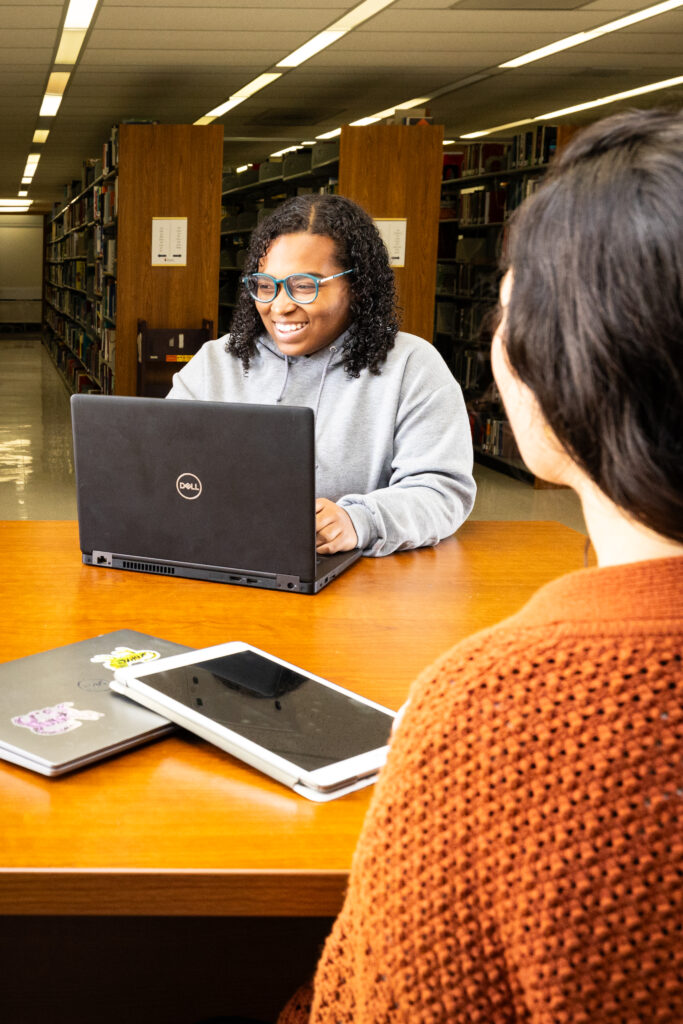Undergraduate Research Fellowship
The vital role of libraries and librarians in creating, communicating, and disseminating research and scholarship is often invisible to undergraduate students. The UNC Greensboro University Libraries’ Undergraduate Research Fellowship will provide undergraduate students interested in academic research with an opportunity to partner with faculty and staff in the University Libraries on developing, creating, and disseminating research, scholarship, and/or creative works that make use of the resources, collections, and expertise found in the University Libraries.
The Undergraduate Research Fellows’ work may intersect with any of the Libraries’ areas of collections or expertise, including scholarly communication, archives and primary sources, development of open education resources, oral history, data visualization, information literacy, etc. Fellowships may result in traditional academic publications, but may also lead to other methods of disseminating knowledge, such as the creation of digital scholarship, digital collections, curated exhibits, or creative performances. The work done during the fellowship may also represent the beginning of your research process, with University Libraries faculty and staff working with you to develop a research plan, perform a literature review, create a data management plan, or perform other work that lays the foundation for future scholarship.
Timeframe, Eligibility, Funding, and Applying
Applications are not currently being accepted. Please check back for more details.

FAQs
Can I receive academic credit and the University Libraries Undergraduate Research Fellowship for the same project?
It is okay to receive course credit and the University Libraries Undergraduate Research Fellowship for the same project, but no student should be paid for the same work twice.
Can I apply for this Fellowship if I also hold an Undergraduate Research and Creativity Award from the Undergraduate Research, Scholarship, and Creativity Office (URSCO)?
You cannot hold an Undergraduate Research and Creativity Award (URCA) at the same time as the University Libraries Undergraduate Research Fellowship. If you hold an URCA for Summer 2022, you are not eligible for the University Libraries Undergraduate Research Fellowship. However, if you held an URCA for Spring or Fall, you are eligible for the University Libraries Undergraduate Research Fellowship.
What kinds of research projects might be part of the fellowship?
Any kind of research project that makes substantial use of the resources, collections, and expertise found in the University Libraries can be part of the fellowship. The work done in the fellowship may represent the beginning of your research process, or it may result in a final product.
Does UNCG provide support for students to present at conferences?
Yes! The Undergraduate Research, Scholarship, and Creativity Office (URSCO) has a travel fund available to provide students with supplemental travel support to present results of their research, scholarship and/or creative activity at professional conferences in their field. For more information, see https://ursco.uncg.edu/funding/ursco-travel-fund/.
Can I do the work of the fellowship remotely?
Depending on the type of research you are conducting and the resources you need in order to do that work, you may be able to do all or part of this Fellowship remotely.
Are there opportunities for me to share my research on campus?
Yes! The Carolyn and Norwood Thomas Undergraduate Research and Creativity Expo is a campus-wide celebration of undergraduate research, scholarship, and creative activities. All students engaged in faculty-mentored scholarly inquiry are encouraged to participate. Students are eligible to compete for program recognition, which includes monetary awards. The Expo typically takes place in late Spring. For more information, see https://ursco.uncg.edu/expo/.
How will applications be evaluated?
Submissions will be evaluated based on a 100 point scale. Evaluators will be looking for:
- Clearly defined project goals (25 points)
- Clearly defined research methods (25 points)
- Clearly articulated role of the library mentor and the importance of library collections and resources in achieving the project goals (30 points)
- Clearly defined benefit to the student (20 points)

